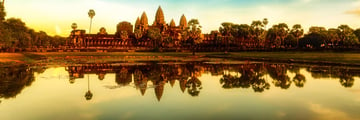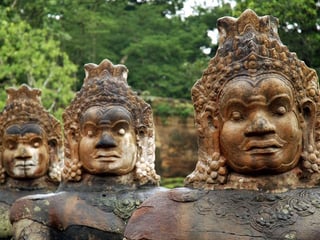A first-timer's guide to holidaying in Cambodia
It may be small, but Cambodia has a huge heart. Despite the country’s traumatic history, which you can learn about on a visit to the Killing Fields, Cambodia is full of welcoming people and stunning landscapes. Explore beaches, golden palaces, rural villages and the world’s most impressive temple complex: UNESCO-listed Angkor Wat. Plan your trip to Cambodia with this guide, which includes everything from visa and flight information to money, weather and how to get around.

What’s in this guide?
• Cambodia highlights
• When to go to Cambodia
• Weather in Cambodia
• Cambodia flights and transfers
• Visa requirements
• Language
• Transportation
• Currency
• Electricity
• Vaccinations and health
• Time difference
• Festivals and events
• Food, drink and nightlife
Cambodia highlights
• Explore the UNESCO-listed Angkor Archeological Park and mighty Angkor Wat
• Take a boat trip on Tonle Sap Lake and visit its floating villages
• Enjoy some beach time in Sihanoukville and Koh Rong
• Visit the moving Tuol Sleng Prison and Killing Fields near Phnom Penh
• Relax in the riverside town of Kampot
• Experience a slice of rural Cambodia in Battambang
• Wander the Silver Pagoda and Royal Palace in Phnom Penh
• Spot Irrawaddy dolphins on the Mekong River near Kratie
Further reading: Discover the top 10 things to do in Cambodia.

When to go to Cambodia
Most tourists visit Cambodia during its cooler and less humid months, which fall between October and February. This is the most comfortable season, whether you’re temple hopping around Angkor Wat or lazing on the beach, but also the busiest. Crowds at the temples can be overwhelming and hotel prices may also rise.
It’s quieter and cheaper to visit Cambodia during the hot, rainy season from May to September. However, dirt roads can become flooded in the rains so it can be difficult to get around. Aim for the shoulder months rather than May and June when Cambodia is at its hottest and most humid.
Weather in Cambodia
Cambodia is warm all year-round but has two main seasons, wet and dry. May to September is rainy season, when downpours are common and Tonle Sap Lake grows to five times its normal size, which is great for visiting the floating villages. The dry season falls between October and April. Temperatures are cooler, dipping to 24 degrees Celsius from October to February, there are highs of up to 35 degrees Celsius from March until June.

Cambodia flights and transfers
There are no direct flights from the UK to Cambodia, but connecting flights go from London and other major UK cities, usually taking about 14 hours. Flights connect in places like China, Malaysia, Thailand and Singapore, which can be good destinations to stop off in for a few days to break up your trip. Popular airlines serving these routes include Thai Airways, Emirates, Cathay Pacific, China Southern and Malaysia Air.
Cambodia borders Thailand, Laos and Vietnam which you can add to your itinerary for a more diverse Southeast Asian tour. Cheap flights, as well as buses, go to these destinations from Phnom Penh and Siem Reap. When your flight lands in Cambodia it’s cheap and easy to arrange a taxi to your accommodation. Ask your hotel about this in advance, as they may offer free transfers.
Visa requirements
British nationals can get a 30-day tourist visa on arrival for Cambodia, whether you travel into the country by plane or overland. The fee is US $30, make sure you have the amount ready in US Dollars to give to border officials. To get a Cambodian visa, you must have at least six months validity on your passport, a passport photo and your fee. Children under 12 travelling on their parent’s passport may not need a separate visa.
You can also now apply for a 30-day e-visa online from https://www.evisa.gov.kh/. This costs $36 and is available if you enter Cambodia via:
• Phnom Penh International Airport
• Siem Reap International Airport
• Sihanoukville International Airport
• Overland at the Poi Pet or Cham Yeam borders with Thailand
• Overland at the Bavet border with Vietnam
• Overland at the Tropaeng Kreal border with Laos
While not required, it’s a good idea to take proof of your return flights or onward travel arrangements with you in case a border official asks for them.
Arrival Card
From 1 July 2024, all passengers travelling to Cambodia will also be required to submit an electronic arrival card at least 7 days before arrival. For those who do not have time to submit the card before arrival, tablets will be available at airports. This new 'Cambodia e-arrival card' can be accessed and submitted only via the official website here: www.arrival.gov.kh or through Apple's App Store and Google Play Store. The same platform can also be used to reserve an e-visa on arrival.
Passengers entering Cambodia on or before 30 June 2024 can opt for this new electronic process or use the traditional paper form on arrival.
Language
Khmer is the official language in Cambodia, but English is widely spoken, especially in tourist destinations and places like hotels, restaurants and shops. Some of the older generation also speak a bit of French due to their colonial roots. Here are some basic Khmer phrases that are useful to know when visiting Cambodia:
• Hello – Suus-dei
• Please – Suom
• Thank you – Aw-koon

Transportation
• Internal flights – you can fly domestically between three destinations in Cambodia: Phnom Penh, Siem Reap and Sihanoukville. One-way flights usually cost less than £50 and take under two-and-a-half hours. Airlines include Bassaka Air, Lanmei Airlines, Cambodia Angkor Air, Hahn Air and Cambodia Bayon Airlines.
• Train – Cambodia has a revived rail service since 2016 that runs between Sihanoukville and Phnom Penh, via Kampot. It’s operated by Royal Railways and costs less than £8 per journey, you can buy tickets from the station or online from Baolau.com. Trains are comfortable and you get a taste of local travel while watching the Cambodian scenery pass you by.
• Bus – this is the cheapest and most common way to get around Cambodia. The bus network covers all major cities and tourist destinations and journeys typically cost less than £10 per person, one way. Local buses are slower but cheaper, while tourist buses are faster with air conditioning. Some of the best companies include 168 Sorya, Capitol and Giant Ibis, which is the most luxurious. You can book tickets at the station, through your hotel or online. Most buses depart and arrive at bus company offices.
• Boat – boat services run daily between Phnom Penh and Siem Reap and Siem Reap and Battambang but are less popular than the bus. An express boat goes from Phnom Penh to Siem Reap in five hours and offers incredible views of the Tonle Sap River. You can also take scenic boat trips on Tonle Sap Lake and to see the Irrawaddy Dolphins on the Mekong from Kratie.
• Car and tuk tuk – renting a private car and driver is a more expensive but comfortable option in Cambodia. You can also take taxis and remork-motos (tuk tuks) for local journeys and tours, be sure to wear a face mask for dusty roads and pollution in the cities.

Currency
Cambodia’s local currency is the Cambodian Riel, but US Dollars are widely used across the country. Often, hotel, tour and restaurant prices will be quoted in US Dollars, but you may use Riel when dealing with small change. You can find ATM’s in most towns and cities in Cambodia, but some may not accept foreign cards, so it’s a good idea to exchange currency before you arrive.
Be aware that ATM’s in Cambodia can have withdrawal fees and your UK bank may also charge a foreign transaction fee. Contact your bank before you travel to find out about charges and let them know you’re going abroad so they don’t freeze your account because of suspicious activity.
Electricity
Cambodia uses 230 volts and a frequency of 50Hz, similar to the UK. You can sometimes use British-style, three-pinned plugs, but take a European-style, two-pinned flat or round adapter as well.
Vaccinations and health
The NHS recommends that all travellers schedule a medical check-up with their GP before going abroad to ensure they have the necessary immunisations. These include routine vaccinations and boosters such as measles-mumps-rubella and diphtheria-tetanus-polio. You should also take out comprehensive travel insurance and have the following vaccinations:
• Hepatitis A
• Tetanus
• Typhoid
Recommended vaccinations are also recommended:
• Hepatitis B
• Tuberculosis
• Japanese Encephalitis
• Rabies – if you’re likely to come into contact with animals
There is a low risk of malaria in Cambodia, but Dengue Fever and the Zika Virus are present, so you should try to avoid mosquito bites. Cover up in the evenings and be sure to use insect repellent with DEET, especially in forested areas.
Time difference
Cambodia is seven hours ahead of GMT.
Festivals and events
The biggest annual festival in Cambodia is the Khmer New Year, Bonn Chaul Chhnam, which is celebrated on the 13th or 14th of April. People use this time to get together with family and make offerings at temples. Pchum Ben is also known as the Festival of the Dead and usually takes place in late September when Cambodians make offerings to earn merit and keep their ancestors safe.
Another popular festival is the Royal Ploughing Ceremony, Bonn Chroat Preah Nongkoal, which takes place in May at the start of the planting season in Phnom Penh. There are chanting monk sessions and offerings to pray for a successful harvest. The three-day water festival in November takes place in Phnom Penh and Siem Reap and features boat races, fireworks and street festivals.

Food, drink and nightlife
Cambodian food relies heavily on fish and its paste is used as a flavouring in many meals. Fish is served grilled, stir-fried with herbs and spices or cooked into curries such as Fish Amok. Rice is served with most dishes and somlars, soups, are common accompaniments. For cheap eats, visit the street stalls, markets and local eateries. In tourist destinations, there are western-style restaurants, many are run by NGOs and employ local people.

Cambodia’s best nightlife is based in its largest cities, Phnom Penh and Siem Reap. Enjoy everything from cheap street-side bars to cosy pubs and chic clubs. Laid-back beach bars can be found in destinations like Sihanoukville and Kampot. Drinks are cheap, usually less than a dollar and the national beer, Angkor, can be found everywhere. Cocktails, as well as imported spirits and wines are more expensive.
More Inspiration
Recommended holidays














